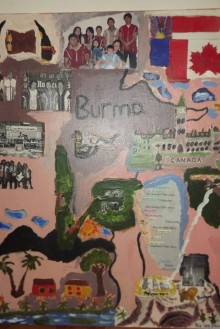A migration story as told by a Karen Woman
June 28, 2016 Thelay Paw Kyi is an ethnic Karen woman who, against all odds, came to Canada with her family. She was born in Karen State,(Kawthoolei) in Burma
Thelay Paw Kyi is an ethnic Karen woman who, against all odds, came to Canada with her family. She was born in Karen State,(Kawthoolei) in Burma
In this work she depicts the series of events that are her life. Thelay, a leader in the Ottawa Karen Community resettled in Ottawa, Canada in 2006
The following is a narrative of this mixed media that Thelay shares with others;
“You can see the beginning of my story in the lower left corner, I lived with my parents in our Karen village. It was a peaceful farming life along the river. When I was twelve years old we learned that the military government in Burma had started a war against our people. When they (the SPDC soldiers) came to our village my family had to run away.The soldiers burned our village down.
Centre grey and dark green – We ran away into the jungle. We were like thousands of little mice running through the jungle to get away from the killer cobra (the military) That cobra kept hunting us all through the jungle. Our Karen people were killed and murdered and the women were raped and then shot. We lived in the jungle, thousands of mice running, and running, and running.
Lower right: We ran to Thailand and for a few years we stayed in Thai/Karen villages. Then the Tiger Kingdom (Thailand) gathered up all the Karen people that came from Burma and put us into refugee camps along the Thai/Burma border where we were moved from camp to camp. The Karen people in the Tiger Kingdom were controlled by the Thai soldiers. If we left our cage we were put in prison where we had to pay money to get out. Then, back the mice would scurry, into their refugee cages always under the eye of the fierce tiger. We just stayed in the camp. Some NGO’s helped us to build our life in the camp, they helped us with schools and hospitals and food.
Top right: Then in 2006 the UNHCR and NGO’s decided that the Karen people in the camps could go to the resettle to many countries. My family and some of my Karen friends flew to Ottawa, Canada. When I first came to Canada I didn’t know any English now I’m improving a little. And that’s the end of my story, now I have a new life. We are free. ”
Top: Family photos and symbols
Story originally posted by KLEO Ottawa.


 In our city’s history, immigrants have always played an important role. They build our economic prosperity, diversify our culture, contribute to our social vitality.
In our city’s history, immigrants have always played an important role. They build our economic prosperity, diversify our culture, contribute to our social vitality.

